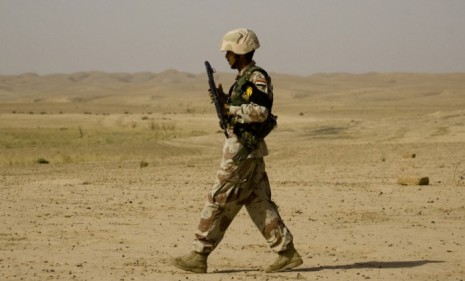Is post-war Iraq better off?
The end of U.S. combat operations in Iraq has prompted pundits to consider what we achieved in the battle-scarred country

A free daily email with the biggest news stories of the day – and the best features from TheWeek.com
You are now subscribed
Your newsletter sign-up was successful
After seven years, $1 trillion spent, and more than 4,400 soldiers lost, the U.S. has declared an end to combat operations in Iraq. The despot who tyrannized the country for decades has been deposed and executed, and the Iraqi people now have the right to choose their leaders — but sectarian violence is rife and the country's political system has been locked in a stalemate since March's inclusive election. Now that the war has ended, can we really say that the U.S. invasion changed Iraq for the better? (Watch an al Jazeera discussion about post-war Iraq)
We leave a nation on the brink of civil war: This "unprovoked invasion" has brought little but chaos and despair to Iraq, says Robert Dreyfuss in The Nation. The U.S. has shattered Iraq's economy and state institutions and damaged the social fabric "in a manner that will take at least two generations to repair." Now that we've left, Iraq's "bitterly divided body politic" will struggle not to descend into civil war. No wonder Obama wants to "turn the bloody page."
"Unstable Iraq may draw Obama back to war"
The Week
Escape your echo chamber. Get the facts behind the news, plus analysis from multiple perspectives.

Sign up for The Week's Free Newsletters
From our morning news briefing to a weekly Good News Newsletter, get the best of The Week delivered directly to your inbox.
From our morning news briefing to a weekly Good News Newsletter, get the best of The Week delivered directly to your inbox.
Democracy may still flourish in this broken state: Although Iraq is still a "chaotic mess" in many ways, says The Economist's Lexington blog, the seeds of political stability are taking root. A "largely peaceful election" in 2009 proved that Iraqis understand democracy "and would like it for themselves." Alas, the continuing stalemate means the task is only half-finished. It's a shame the U.S. has left before the job is done.
"I came, I saw, I withdrew from Iraq"
There's still work to do, but we did bring change for the good: Actually, Iraq is on the rise, says David Brooks at The New York Times. Our presence in the country has resulted in "measurable, positive results." There has been "substantial progress" in living standards, economic growth, and security. This "bottom-up social change" is not yet complete, but "Iraqi opportunity" — previously non-existent — is now booming.
A free daily email with the biggest news stories of the day – and the best features from TheWeek.com
We didn't go to war just to help Iraqis: To view this war simply as an effort to install democracy in Iraq is a "profound mistake," says Daniel Henninger at The Wall Street Journal. This war was about us, too. Saddam "aspired to play in the same league as Iran and North Korea," and would undoubtedly have sought nuclear weapons had he been allowed to carry on. The world ought to thank us for making it a safer place.